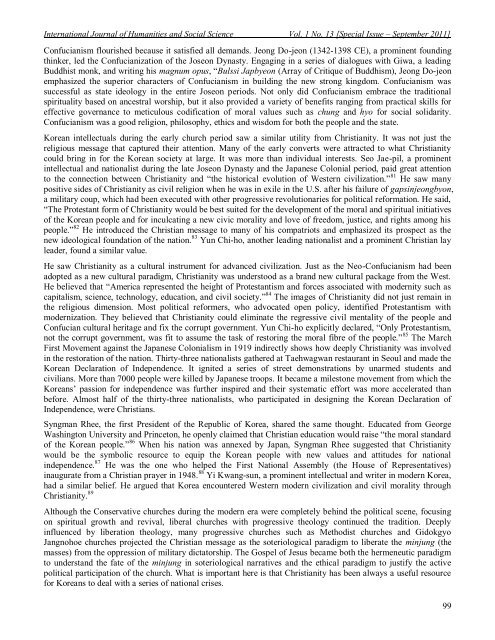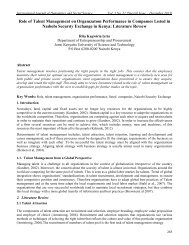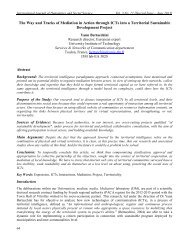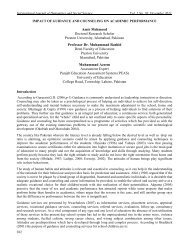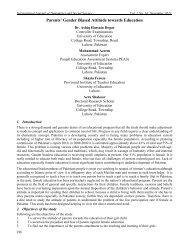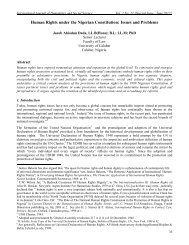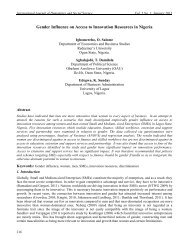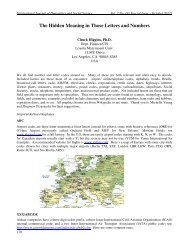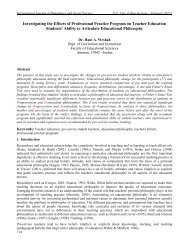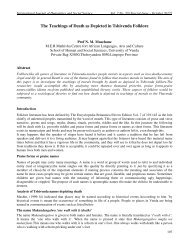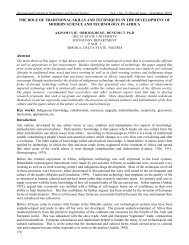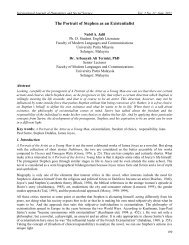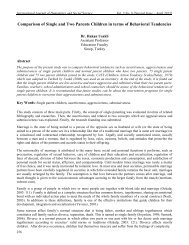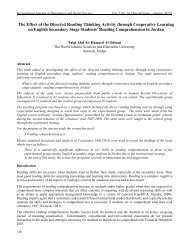Revisiting the Confucian Norms in Korean Church Growth
Revisiting the Confucian Norms in Korean Church Growth
Revisiting the Confucian Norms in Korean Church Growth
You also want an ePaper? Increase the reach of your titles
YUMPU automatically turns print PDFs into web optimized ePapers that Google loves.
International Journal of Humanities and Social Science Vol. 1 No. 13 [Special Issue – September 2011]<br />
<strong>Confucian</strong>ism flourished because it satisfied all demands. Jeong Do-jeon (1342-1398 CE), a prom<strong>in</strong>ent found<strong>in</strong>g<br />
th<strong>in</strong>ker, led <strong>the</strong> <strong>Confucian</strong>ization of <strong>the</strong> Joseon Dynasty. Engag<strong>in</strong>g <strong>in</strong> a series of dialogues with Giwa, a lead<strong>in</strong>g<br />
Buddhist monk, and writ<strong>in</strong>g his magnum opus, “Bulssi Japbyeon (Array of Critique of Buddhism), Jeong Do-jeon<br />
emphasized <strong>the</strong> superior characters of <strong>Confucian</strong>ism <strong>in</strong> build<strong>in</strong>g <strong>the</strong> new strong k<strong>in</strong>gdom. <strong>Confucian</strong>ism was<br />
successful as state ideology <strong>in</strong> <strong>the</strong> entire Joseon periods. Not only did <strong>Confucian</strong>ism embrace <strong>the</strong> traditional<br />
spirituality based on ancestral worship, but it also provided a variety of benefits rang<strong>in</strong>g from practical skills for<br />
effective governance to meticulous codification of moral values such as chung and hyo for social solidarity.<br />
<strong>Confucian</strong>ism was a good religion, philosophy, ethics and wisdom for both <strong>the</strong> people and <strong>the</strong> state.<br />
<strong>Korean</strong> <strong>in</strong>tellectuals dur<strong>in</strong>g <strong>the</strong> early church period saw a similar utility from Christianity. It was not just <strong>the</strong><br />
religious message that captured <strong>the</strong>ir attention. Many of <strong>the</strong> early converts were attracted to what Christianity<br />
could br<strong>in</strong>g <strong>in</strong> for <strong>the</strong> <strong>Korean</strong> society at large. It was more than <strong>in</strong>dividual <strong>in</strong>terests. Seo Jae-pil, a prom<strong>in</strong>ent<br />
<strong>in</strong>tellectual and nationalist dur<strong>in</strong>g <strong>the</strong> late Joseon Dynasty and <strong>the</strong> Japanese Colonial period, paid great attention<br />
to <strong>the</strong> connection between Christianity and “<strong>the</strong> historical evolution of Western civilization.” 81 He saw many<br />
positive sides of Christianity as civil religion when he was <strong>in</strong> exile <strong>in</strong> <strong>the</strong> U.S. after his failure of gaps<strong>in</strong>jeongbyon,<br />
a military coup, which had been executed with o<strong>the</strong>r progressive revolutionaries for political reformation. He said,<br />
“The Protestant form of Christianity would be best suited for <strong>the</strong> development of <strong>the</strong> moral and spiritual <strong>in</strong>itiatives<br />
of <strong>the</strong> <strong>Korean</strong> people and for <strong>in</strong>culcat<strong>in</strong>g a new civic morality and love of freedom, justice, and rights among his<br />
people.” 82 He <strong>in</strong>troduced <strong>the</strong> Christian message to many of his compatriots and emphasized its prospect as <strong>the</strong><br />
new ideological foundation of <strong>the</strong> nation. 83 Yun Chi-ho, ano<strong>the</strong>r lead<strong>in</strong>g nationalist and a prom<strong>in</strong>ent Christian lay<br />
leader, found a similar value.<br />
He saw Christianity as a cultural <strong>in</strong>strument for advanced civilization. Just as <strong>the</strong> Neo-<strong>Confucian</strong>ism had been<br />
adopted as a new cultural paradigm, Christianity was understood as a brand new cultural package from <strong>the</strong> West.<br />
He believed that “America represented <strong>the</strong> height of Protestantism and forces associated with modernity such as<br />
capitalism, science, technology, education, and civil society.” 84 The images of Christianity did not just rema<strong>in</strong> <strong>in</strong><br />
<strong>the</strong> religious dimension. Most political reformers, who advocated open policy, identified Protestantism with<br />
modernization. They believed that Christianity could elim<strong>in</strong>ate <strong>the</strong> regressive civil mentality of <strong>the</strong> people and<br />
<strong>Confucian</strong> cultural heritage and fix <strong>the</strong> corrupt government. Yun Chi-ho explicitly declared, “Only Protestantism,<br />
not <strong>the</strong> corrupt government, was fit to assume <strong>the</strong> task of restor<strong>in</strong>g <strong>the</strong> moral fibre of <strong>the</strong> people.” 85 The March<br />
First Movement aga<strong>in</strong>st <strong>the</strong> Japanese Colonialism <strong>in</strong> 1919 <strong>in</strong>directly shows how deeply Christianity was <strong>in</strong>volved<br />
<strong>in</strong> <strong>the</strong> restoration of <strong>the</strong> nation. Thirty-three nationalists ga<strong>the</strong>red at Taehwagwan restaurant <strong>in</strong> Seoul and made <strong>the</strong><br />
<strong>Korean</strong> Declaration of Independence. It ignited a series of street demonstrations by unarmed students and<br />
civilians. More than 7000 people were killed by Japanese troops. It became a milestone movement from which <strong>the</strong><br />
<strong>Korean</strong>s‟ passion for <strong>in</strong>dependence was fur<strong>the</strong>r <strong>in</strong>spired and <strong>the</strong>ir systematic effort was more accelerated than<br />
before. Almost half of <strong>the</strong> thirty-three nationalists, who participated <strong>in</strong> design<strong>in</strong>g <strong>the</strong> <strong>Korean</strong> Declaration of<br />
Independence, were Christians.<br />
Syngman Rhee, <strong>the</strong> first President of <strong>the</strong> Republic of Korea, shared <strong>the</strong> same thought. Educated from George<br />
Wash<strong>in</strong>gton University and Pr<strong>in</strong>ceton, he openly claimed that Christian education would raise “<strong>the</strong> moral standard<br />
of <strong>the</strong> <strong>Korean</strong> people.” 86 When his nation was annexed by Japan, Syngman Rhee suggested that Christianity<br />
would be <strong>the</strong> symbolic resource to equip <strong>the</strong> <strong>Korean</strong> people with new values and attitudes for national<br />
<strong>in</strong>dependence. 87 He was <strong>the</strong> one who helped <strong>the</strong> First National Assembly (<strong>the</strong> House of Representatives)<br />
<strong>in</strong>augurate from a Christian prayer <strong>in</strong> 1948. 88 Yi Kwang-sun, a prom<strong>in</strong>ent <strong>in</strong>tellectual and writer <strong>in</strong> modern Korea,<br />
had a similar belief. He argued that Korea encountered Western modern civilization and civil morality through<br />
Christianity. 89<br />
Although <strong>the</strong> Conservative churches dur<strong>in</strong>g <strong>the</strong> modern era were completely beh<strong>in</strong>d <strong>the</strong> political scene, focus<strong>in</strong>g<br />
on spiritual growth and revival, liberal churches with progressive <strong>the</strong>ology cont<strong>in</strong>ued <strong>the</strong> tradition. Deeply<br />
<strong>in</strong>fluenced by liberation <strong>the</strong>ology, many progressive churches such as Methodist churches and Gidokgyo<br />
Jangnohoe churches projected <strong>the</strong> Christian message as <strong>the</strong> soteriological paradigm to liberate <strong>the</strong> m<strong>in</strong>jung (<strong>the</strong><br />
masses) from <strong>the</strong> oppression of military dictatorship. The Gospel of Jesus became both <strong>the</strong> hermeneutic paradigm<br />
to understand <strong>the</strong> fate of <strong>the</strong> m<strong>in</strong>jung <strong>in</strong> soteriological narratives and <strong>the</strong> ethical paradigm to justify <strong>the</strong> active<br />
political participation of <strong>the</strong> church. What is important here is that Christianity has been always a useful resource<br />
for <strong>Korean</strong>s to deal with a series of national crises.<br />
99


